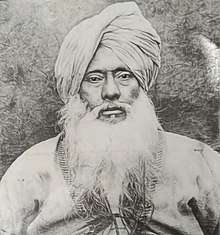Atharuddin Mohammed
Atharuddin Mohammed was an Odia military officer, feudatory chief (Samanta) of Kamakhyanagar and the Dewan of the princely state of Dhenkanal during Raja Dinabandhu Mahendra Bahadur (1877 - 1885) and Raja Shura Pratap Mahendra Bahadur's rule. He was one among the first princely officials to join the Odia unification movement and the Utkal Sabha.[1]
Atharuddin Mohammed | |
|---|---|
 Atharuddin Mohammed PM of Dhenkanal State (1877) | |
| Prime Minister of Dhenkanal State | |
| In office 1877 - c. 1899 | |
| Samanta of Kamakhyanagar | |
| In office 1868 - c. 1899 | |
| Personal details | |
| Born | 1859 A.D. Kamakhyanagar, Dhenkanal State |
| Died | 21 April 1931 Cuttack, British India |
| Spouse(s) | Begum Nadeera Sultana, Shahbano Begum, Ruqqaiya Begum |
| Children | Sayeed Mohammed, Akhir Mohammed, Shaukat Begum, Barkat Begum, Rafique Mohammed |
| Father | Fazal Mohammed |
| Military service | |
| Rank | Prime Minister |
Biography
Atharuddin Mohammed was born as the eldest son of Pir Fazal Mohammed, a notable Persian philosopher and mystic of the Ni'matullāhī order who later joined the service of Raja Bhagiratha Mahendra, the Raja of Denkanal. Fazal Mohammed was appointed as the Samanta of Kamakhyanagar and after his death, his son Atharuddin took over the position. Athar rose to prominence in the eyes of the king by displaying his bravery and wit. He was appointed as the Dewan by the newly crowned king, Raja Dinabandhu Mahendra in 1877.[2] During his tenure Atharuddin organised the last elephant fair in Odisha.[3][4]
With the beginning of the Praja Mandal movement in Dhenkanal State. The peasants all over the kingdom started revolting against the repressive policies adopted by the new king, Raja Shura Pratap Bahadur. Atharuddin tried to pacify the situation by signing a temporary truce with the revolters. However, it did not last long. Inspired by the nationalists, he sent his son Sayeed Mohammed to Cuttack to attain formal education. Later in 1899, Atharuddin moved to Cuttack and joined the Utkal Sabha. He along with Madhusudan Das, Rev Shem Sahu, John Samson Rout, Bhagaban Chandra Das, Ramesh Chandra Mandal, and Gauri Shankar Ray attended the Congress sessions held at different places and a took keen interest in the activities of the Congress in its early years. Atharuddin acted as a pioneer in bringing the message of Congress and its liberal ideas to Coastal Odisha in the last two decades against the British authorities.[5]
He built the Fazal Mohammed Masjid (present-day Choti Masjid)[6] in the memory of his deceased father near his residence at Dargaah Bazaar. He also donated lands for building jails in Cuttack.[7]
References
- selfstudyhistory, Author (2015-02-13). "PRAJA MANDAL MOVEMENTS IN PRINCELY STATES". SELF STUDY HISTORY. Retrieved 2020-06-09.
- Rathore, Abhinay. "Dhenkanal (Princely State)". Rajput Provinces of India. Retrieved 2020-06-09.
- "The Prajamandal Movement – History of Odisha". Retrieved 2020-06-09.
- "Athar Mohammed and other minority leaders" (PDF). Cite journal requires
|journal=(help) - Mishra, P. K. (1978). "THE EARLY PHASE OF NATIONALIST MOVEMENT IN ORISSA : (1885-1905)". Proceedings of the Indian History Congress. 39: 646–651. ISSN 2249-1937.
- "Cuttack samithi of Cuttack district (Odisha) does Seva | Sri Sathya Sai Seva Organisations India". Retrieved 2020-06-09.
- "British-era jail in Cuttack wallows in neglect". The New Indian Express. Retrieved 2020-06-09.